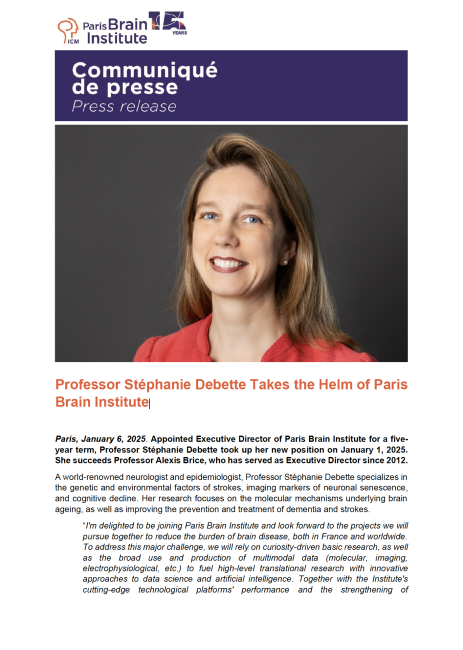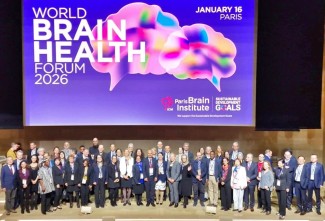Appointed Executive Director of Paris Brain Institute for a five-year term, Professor Stéphanie Debette took up her new position on January 1, 2025. She succeeds Professor Alexis Brice, who has served as Executive Director since 2012.
A world-renowned neurologist and epidemiologist, Professor Stéphanie Debette specializes in the genetic and environmental factors of strokes, imaging markers of neuronal senescence, and cognitive decline. Her research focuses on the molecular mechanisms underlying brain ageing, as well as improving the prevention and treatment of dementia and strokes.
I'm delighted to be joining Paris Brain Institute and look forward to the projects we will pursue together to reduce the burden of brain disease, both in France and worldwide. To address this major challenge, we will rely on curiosity-driven basic research, as well as the broad use and production of multimodal data (molecular, imaging, electrophysiological, etc.) to fuel high-level translational research with innovative approaches to data science and artificial intelligence. Together with the Institute's cutting-edge technological platforms' performance and the strengthening of international partnerships, these assets will enable us to collaboratively design an ambitious and collaborative program to broaden the horizons of neuroscience and accelerate the development of therapeutic innovations.
A Distinguished Career in Neuroscience and Public Health
After earning her medical degree in 2006, completing a neurology residency at CHRU Lille, and receiving additional training in vascular neurology, Professor Stéphanie Debette studied genetic statistics at the Pasteur Institute in Lille and obtained a PhD in epidemiology at the University of Lille.
She then pursued research in clinical neuroscience at St George's University Hospital in London and completed a postdoctoral fellowship at Boston University School of Medicine in the neuroepidemiology and neurogenetics unit, where she contributed to studies on the renowned Framingham cohort. She obtained her accreditation to supervise research from Paris Diderot University in 2013. A senior lecturer in Paris from 2010 to 2014, she joined the University of Bordeaux as a professor and hospital practitioner in 2014.
Professor Stéphanie Debette's career is marked by a commitment to large-scale basic research projects, notably on the genomics of complex neurological diseases, and an investment in clinical research—to improve patient care and diagnosis. She coordinates and actively participates in international expert committees developing clinical practice guidelines and recommendations.
These activities are enriched by over 300 publications, an ERC, a European research program on neurodegenerative diseases (JPND), and a hospital-university research program on cerebral small vessel disease (RHU SHIVA). In 2023, her Vascular Brain Health Institute (VBHI) project in Bordeaux won the IHU 3 call for projects under France 2030. It is positioned at the crossroads of excellence in public health, neuroscience and cardiovascular research.
As president of the International Stroke Genetics Consortium (ISGC) and a member of the research steering committee of the Cohorts for Heart and Aging Research in Genomic Epidemiology (CHARGE) consortium, she has helped expand research collaborations across continents, establishing partnerships not only in Europe, North America, Australia, as well as Asia, Africa, and Latin America. From 2018 to 2022, she served as Vice President for External Relations at the University of Bordeaux and co-led the creation of the ENLIGHT European university alliance.
Ambitions To Serve Paris Brain Institute
Professor of Epidemiology and Public Health at the University of Bordeaux and a neurologist at Bordeaux University Hospital since 2014, Professor Stéphanie Debette directed the Bordeaux Population Health Research Center (BPH), co-hosted by the University of Bordeaux and Inserm, until April 2024, and the VBHI IHU since 2023.
Her interest in the determinants and evolution of health naturally extended to the core mission of Paris Brain Institute: to understand and treat neurological and psychiatric diseases, many of which are increasingly prevalent and represent a significant burden for our society.
From January 2025, she will co-lead a new research team at Paris Brain Institute alongside Professor Hugues Chabriat. This team will focus on cerebral vascular diseases, including the continuum between genetic factors that contribute to rare monogenic forms and common multifactorial forms. It will also study the impact of vascular factors on neurodegenerative diseases.
The appointment of Professor Stéphanie Debette follows a rigorous selection process, Professor Stéphanie Debette's appointment follows a rigorous selection process based on the recommendations of a Search Committee and the Coordination Committee of the General Convention, bringing together all Paris Brain Institute’s partners
Selection of Awards and Distinctions
2008: Bettencourt Prize for Young Researchers.
2016: Claude Pompidou Foundation Prize for Alzheimer's Research.
2019: Scientific Excellence Award from the European Stroke Organization.
2022: Knight of the French National Order of Merit.
2023: Marie-Claude Burrus Prize from the French Foundation for Medical Research.
2024: Hans-Chiari Prize from the Austrian Stroke Society.
2024: Scientific Prize from the NRJ-Institut de France Foundation.
2024: Inserm Grand Prize.
2024: Elected Member of the French Academy of Sciences, Biology and Health Division.









